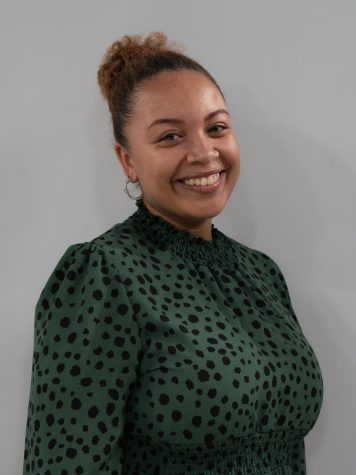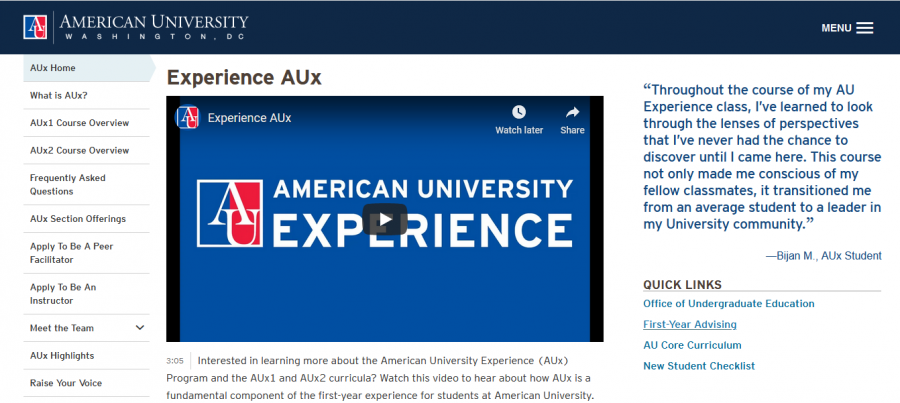AUx staff members say they face racism from upper university leadership
BIPOC first-year advisors dread going to meetings each week due to fear of being emotionally harmed by racist comments
First-year advisors, who teach the American University Experience or AUx curriculum that centers Black, indigenous, and people of color or BIPOC voices, say they have been experiencing constant coded racist language from leaders above them.
AUx is a two-part course that all first-year students must take. Students take the first 1.5 credits in the fall with their first-year advisors, and the second in spring with any first-year advisor.
AUx 2 working group meetings are full of racism
Advisors say the staff members who experience the worst racism are members of the AUx 2 working group, which works on learning outcomes and curriculum modification. This is the first time there has been a working group: in the first two years of the program there was a council made up of non-advisor members.
“We definitely had more demands made of us,” Roshan Abraham, an AUx 2 working group member and first-year advisor said. “Previous working groups or councils have had to do something simple, like change the learning outcomes.”
Abraham equated these extra demands to the fact that the working group is mostly BIPOC staff. “I’m not sure why we were asked to do this, and fact is that the working group is predominantly staff of color,” he said.
The working group has to submit proposals to multiple groups, including the AU Core Council which approves curriculum for all core classes at the university. They have been working on getting the learning outcomes approved for months, something Abraham says has never taken this long in the past. They were passed on Nov.16.
Abraham says the first meeting presenting their ideas for learning outcomes was most difficult to bear.
“We had our qualifications challenged,” he said, “we had a lot of coded racist language thrown at us that amounted to ‘what about the white students?’ They were particularly concerned over conservative white students.”
He said that one of the approval groups was predominantly white. “It’s interesting that no one on this governing body ever noticed, whereas for those of us presenting, it was the first thing we noticed.”
From the time this group began to work on the learning outcomes for the Spring 2021 semester, three Black staff members have resigned from the working group itself, Sarah Jones, a biracial advisor and co-chair of the AUx 2 working group said. They resigned “because of blatant racism – complex conversations that were disguised but were racist” according to Jones.
What makes it harder, Jones said, is that some faculty who are in the groups that approve the curriculum are against a race-focused class – “they just don’t see the point,” she said.
Jones also said that it’s difficult for her to continually subject herself to this, but that she keeps at it because she knows her BIPOC students need it. However, she says it’s beginning to weigh on her.
“I’m scared of my Outlook calendar because, I don’t know, as a Black staff member, when am I going to get harmed in a meeting? It feels like it happens every other week.” Whether it’s an AUx 2 working group meeting, or an all-staff meeting, Jones says racism is hidden in their communication often.
Clashes with leadership
First-year advisor, Nicole Cox, who is white, had enough of the racism from leadership and recently accepted a job at another university.
“Essentially, we’re teaching anti-racism within a racist structure. And people are trying to change it and they are faced with resistance and abuse of power at almost every step,” Cox said.
Racism wasn’t the only reason she left, it was also because she felt she was not being paid enough to do a job with two parts, advisor and instructor. However, she also says that racism plays a role in this, as the university doesn’t have salary transparency.
“Salary transparency is a characteristic of an anti-racist organization,” Cox said. “There are people in my office doing different kinds of work, and everyone’s getting paid a little bit differently, and definitely not enough for the job in general.”
Cox is the first white first-year advisor to leave the program. In the past two years, at least five BIPOC advisors have resigned. Cox, Jones, and Abraham, along with other advisors, said that they brought up this concern to leadership.
Advisors say that when it was brought up it was brushed off. “When this was brought up in large group meetings, they deflected, leadership deflected, and they chalked it up to better opportunities elsewhere,” a first-year advisor source who wishes to remain anonymous due to concerns over job security said.
“I think concerns about staff retention and BIPOC staff retention, or faculty retention, should never be brushed off,” said Jessica Waters, Dean of Undergraduate Education and Vice Provost for Academic Student Services. “I think that is a question that we need to be asking every day because supporting all of our staff, and particularly, you know, noting that with our BIPOC staff, there are often different, different pressures.”
Not only was BIPOC staff retention brushed off, but so were concerns over racism in meetings.
“We’re discussing in class trying to get that through to our students. And then people, colleagues or leadership, get super defensive when someone gets called out and don’t express or acknowledge the harm that people are saying is happening,” Arthur Stallworth, a Black AUx instructor, said. He did make it clear that leadership is willing to at least listen to him, and he is appreciative of the effort.
Waters says that there is still work to do and that there will always be work to do. “I think the time we get it wrong, it’s on us to show up and say, ‘Hey, I understand this was the impact of what happened in this circumstance in this meeting,’ and acknowledge it, and then apologize and do it better next time,” she said.
However, the anonymous source said that there is a stark divide between this and what actually happens.
Reading from a letter sent out to AU staff, they said “Provost Starr made a massive misstep when he essentially said that none of the university’s advancements in racial equality would have happened without the killing of George Floyd.” This statement pushed them over the edge, and it was made worse when Starr doubled down instead of apologizing when confronted.
“One of the worst things in that meeting is that the Provost was in that meeting, but our Dean was in that meeting, and she said nothing. No director in that meeting stood up for the Black faculty and staff in that meeting. They stayed silent,” the source said.
Provost Starr did not respond to a request for comment.
Besides experiencing harmful meetings, advisors say they are often blocked from doing other campus activities.
Abraham says that the most recent instance of this was with the Writer as a Witness program. A new book is chosen each year for first-year students to read as a “community text.” This year the book chosen was called Rising Out of Hatred, a book about a white supremacist un-learning his racism.
First-year advisors thought this book would teach students the wrong thing and drafted a letter to send out which was blocked. Abraham said they were told they were stopped because “we might be stepping on these people’s toes and these people’s toes.”
In a completely different circumstance, Jones says she and a group of other Black women tried to create a safe space for Black students after a video of AU students saying the n-word began to circulate. She said they were eventually allowed to create the spaces, but faced obstacles similar to Abraham like leaders wanting to make sure no feelings were hurt.
Looking ahead
“I think a lot of the limitations or problems come from trying to do a kind of work that the university is not designed to do. The university as an institution, not AU, but universities, are not anti-racist,” Juliana Martínez, instructor and faculty member on the AUx 2 working group, said. She doesn’t believe leadership is completely to blame and says there must be institutional changes to make a difference.
However, there are small differences that staff and leadership hope will make a difference.
One of those is the new Raise Your Voice program, created as a response to the Writer as a Witness book. Abraham proposed this new book program for AUx 2, where BIPOC voices will be centered. The spring 2021 book will be When They Call You a Terrorist: A Black Lives Matter Memoir.
As an additional way to change the curriculum, the learning outcomes for AUx 2 have been modified, according to Waters. There will also be affinity-based AUx 2 sections for Black students.
To help advisors, Waters says that they will no longer be teaching four sections of AUx 2. “Directly responding to the concerns about burnout, we now have them only teaching three sections this spring,” she said.
All in all, AUx staff and leadership all say there is much more work to be done, and staff members are hopeful for a change.
“So far what they’ve done is more of a performative ally-ship,” Stallworth said. “They need to get back more towards making a group difference – being the changemakers that they want the students to be. The administration needs to be that too.”

Jessica Bates (she/her) is a junior studying public relations with a minor in women's, gender and sexuality studies.







